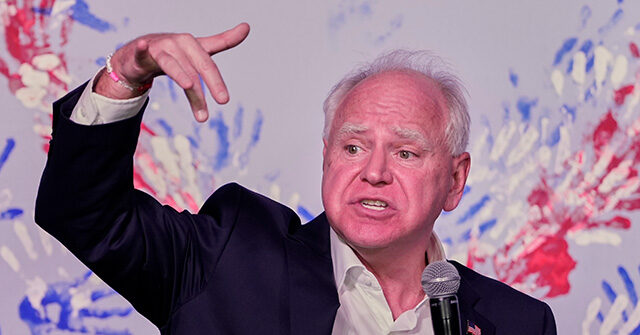In a recent interview with 7 News Detroit, Minnesota Governor Tim Walz, who is the 2024 Democratic vice presidential candidate, reflected on the potential differences in a Kamala Harris-Tim Walz administration regarding Middle Eastern policy compared to the current Biden administration. Walz emphasized the significance of leadership style in international relations, particularly concerning the ongoing violence in the Middle East. Responding to a poignant inquiry from reporter Sarah Michals about the impact on Michigan residents with families in the region, Walz labeled the current humanitarian crisis as “unacceptable,” particularly as it coincides with the anniversary of the Hamas terrorist attack, which has exacerbated tensions and led to significant suffering.
Walz articulated a vision of strong leadership built on the core American values of support for allies and a rejection of authoritarian regimes—a clear critique of former President Donald Trump’s approach. He referenced remarks by General Mark Milley, the former Chairman of the Joint Chiefs of Staff, who characterized Trump as a significant threat to both national and global stability. Walz underscored that a Harris-Walz administration would prioritize solidifying alliances rather than pursuing relationships with dictators. This leadership strategy, according to Walz, would foster a stable and unified stance among U.S. allies in the Middle East and beyond, ultimately promoting a more peaceful cohabitation in conflict-affected regions.
Further elaborating on what a future Harris-Walz administration could mean for policy differences, Walz stressed the importance of trust in leadership. He noted that allies around the world currently feel uncertain about Trump’s reliability, emphasizing that this skepticism extends beyond the Middle East to conflicts in Ukraine and challenges in the Pacific region. He highlighted the necessity of rebuilding relationships and fostering trust through consistent and principled interaction with international partners. According to Walz, Harris’s extensive experience, including meetings with over 150 world leaders, positions her uniquely to navigate complex global relationships compared to her predecessor.
In outlining a potential approach to Middle Eastern policy, Walz mentioned that leadership would involve making tough but necessary decisions that reflect a commitment to humanitarian values. He proposed that a more collaborative and trust-building diplomatic strategy could be established under Harris’s guidance, setting it apart from the current administration’s methods. This involves a departure from any tendencies to engage with or support authoritarian figures, instead leaning into a framework that emphasizes democracy and human rights.
Walz’s remarks speak to a broader commitment to a multilateral approach, one that focuses on coalition-building and international cooperation. This perspective aligns with the principles that undergird modern Democratic foreign policy, which seeks to present the U.S. as a stabilizing force on the global stage. He recognized that the complexities of global relationships especially in volatile areas necessitate a nuanced understanding and dedication to negotiating peace rather than pursuing unilateral actions that could escalate tensions.
In summary, the vision outlined by Governor Walz reflects a clear distinction in foreign policy approach from the previous administration, rooting in the belief that leadership grounded in trust, alliance-building, and adherence to democratic values will allow for effective navigation of challenges in the Middle East and beyond. A partnership between Harris and Walz, he asserts, would represent a return to a strategy that aligns American foreign relations with the nation’s inherent values, aiming for a more peaceful and stable world order.

